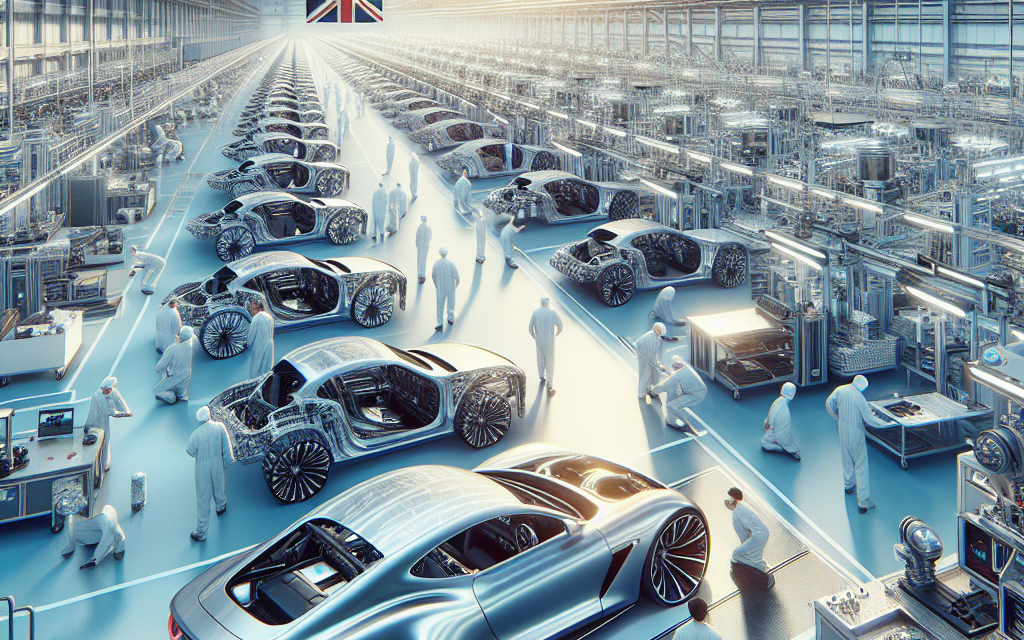“Rolls-Royce Invests £300 Million: Elevating Bespoke Luxury Car Manufacturing in the UK.”
Introduction
Rolls-Royce has announced a significant investment of £300 million aimed at enhancing its custom car manufacturing capabilities in the UK. This commitment underscores the luxury automaker’s dedication to innovation and craftsmanship, ensuring that it remains at the forefront of bespoke vehicle production. The investment will focus on upgrading facilities, incorporating advanced technologies, and expanding the workforce, ultimately reinforcing Rolls-Royce’s reputation for excellence in the automotive industry while contributing to the UK economy.
Rolls-Royce’s Investment in Custom Car Manufacturing
Rolls-Royce, a name synonymous with luxury and craftsmanship, has recently announced a significant investment of £300 million aimed at enhancing its custom car manufacturing capabilities in the United Kingdom. This strategic move underscores the company’s commitment to maintaining its status as a leader in the bespoke automotive sector while simultaneously bolstering the UK’s manufacturing landscape. The investment is expected to facilitate the development of advanced manufacturing techniques and technologies, thereby ensuring that Rolls-Royce remains at the forefront of innovation in the luxury automobile market.
The decision to allocate such a substantial sum towards custom car manufacturing reflects Rolls-Royce’s understanding of the evolving demands of its clientele. In an era where personalization and exclusivity are paramount, the company recognizes that its customers seek not just a vehicle, but a unique expression of their identity and lifestyle. By enhancing its manufacturing capabilities, Rolls-Royce aims to provide an even greater level of customization, allowing clients to tailor their vehicles to their precise specifications. This initiative is not merely about expanding production; it is about deepening the relationship between the brand and its customers, ensuring that each car is a true reflection of individual taste and preference.
Moreover, this investment is poised to create numerous job opportunities within the UK, thereby contributing to the local economy. As Rolls-Royce expands its operations, it will require skilled artisans, engineers, and technicians who are adept in the art of bespoke manufacturing. This focus on local talent not only supports the community but also reinforces the brand’s heritage, as many of the skills required for custom car production are steeped in tradition. By investing in the workforce, Rolls-Royce is ensuring that the craftsmanship that defines its vehicles is preserved and passed down through generations.
In addition to job creation, the investment will also facilitate the adoption of cutting-edge technologies in the manufacturing process. The integration of advanced robotics, artificial intelligence, and data analytics will streamline production while maintaining the high standards of quality that Rolls-Royce is known for. This technological enhancement will not only improve efficiency but also allow for greater precision in the customization process, ensuring that every detail meets the exacting standards of the brand. As a result, customers can expect an even more refined and personalized experience when commissioning their vehicles.
Furthermore, this commitment to enhancing custom car manufacturing aligns with broader trends in the automotive industry, where sustainability and environmental responsibility are becoming increasingly important. Rolls-Royce is likely to incorporate sustainable practices into its manufacturing processes, thereby reducing its carbon footprint while still delivering the luxury and performance that its customers expect. This dual focus on innovation and sustainability positions Rolls-Royce as a forward-thinking leader in the automotive sector, appealing to a new generation of environmentally conscious consumers.
In conclusion, Rolls-Royce’s £300 million investment in custom car manufacturing is a testament to its dedication to excellence, innovation, and customer satisfaction. By enhancing its manufacturing capabilities, the company not only aims to meet the growing demand for bespoke vehicles but also to contribute positively to the UK economy and the environment. As Rolls-Royce continues to evolve, it remains committed to delivering unparalleled luxury and craftsmanship, ensuring that each vehicle is not just a mode of transport, but a masterpiece in its own right.
The Impact of £300 Million on the UK Automotive Industry
The recent announcement by Rolls-Royce to invest £300 million in enhancing custom car manufacturing in the UK marks a significant milestone for the automotive industry, particularly in the realm of luxury vehicles. This substantial financial commitment not only underscores the brand’s dedication to maintaining its heritage and craftsmanship but also signals a broader revitalization of the UK automotive sector. As the industry grapples with challenges such as evolving consumer preferences and increasing competition from global markets, this investment is poised to have far-reaching implications.
Firstly, the infusion of capital into custom car manufacturing is expected to bolster job creation within the sector. Rolls-Royce’s commitment will likely lead to the hiring of skilled artisans and engineers, thereby fostering a workforce that is adept in the intricate processes of bespoke vehicle production. This focus on skilled labor is crucial, as the luxury automotive market thrives on precision and attention to detail. Moreover, the ripple effect of job creation will extend beyond Rolls-Royce itself, benefiting local suppliers and ancillary businesses that support the manufacturing ecosystem. As these companies expand to meet increased demand, the overall economic landscape of the region will experience a positive transformation.
In addition to job creation, the investment will enhance the technological capabilities of Rolls-Royce’s manufacturing facilities. By integrating advanced manufacturing techniques and state-of-the-art machinery, the company aims to streamline production processes while maintaining the high standards synonymous with its brand. This modernization effort is not merely about efficiency; it also reflects a commitment to sustainability. As the automotive industry increasingly prioritizes environmentally friendly practices, Rolls-Royce’s investment may pave the way for innovations that reduce waste and energy consumption, aligning with global sustainability goals.
Furthermore, the £300 million investment is likely to strengthen the UK’s position as a hub for luxury automotive manufacturing. The UK has long been recognized for its rich automotive heritage, and Rolls-Royce’s commitment reinforces the country’s reputation as a leader in high-end vehicle production. This strategic move could attract other luxury brands to consider the UK as a viable location for their manufacturing operations, thereby fostering a competitive environment that encourages innovation and excellence. As more companies invest in the region, the UK automotive industry could see a resurgence, characterized by a diverse range of offerings that cater to an increasingly discerning consumer base.
Moreover, this investment aligns with the broader trends in the automotive market, where customization and personalization are becoming paramount. Consumers are increasingly seeking unique vehicles that reflect their individual tastes and lifestyles. By enhancing its custom car manufacturing capabilities, Rolls-Royce is not only responding to this demand but also setting a benchmark for other manufacturers. This shift towards bespoke offerings could inspire a wave of innovation across the industry, prompting competitors to rethink their strategies and invest in similar capabilities.
In conclusion, Rolls-Royce’s £300 million investment in custom car manufacturing is poised to have a profound impact on the UK automotive industry. By creating jobs, enhancing technological capabilities, and reinforcing the UK’s status as a luxury manufacturing hub, this commitment signifies a bright future for the sector. As the industry evolves, the emphasis on customization and sustainability will likely shape the trajectory of automotive manufacturing, ensuring that the UK remains at the forefront of innovation and craftsmanship in the years to come.
Innovations in Bespoke Car Design at Rolls-Royce
Rolls-Royce, a name synonymous with luxury and craftsmanship, has long been at the forefront of bespoke car design, and its recent commitment of £300 million to enhance custom car manufacturing in the UK underscores this dedication. This significant investment is poised to revolutionize the bespoke experience for customers, allowing for even greater personalization and innovation in the design process. As the automotive industry evolves, Rolls-Royce remains steadfast in its mission to blend traditional craftsmanship with cutting-edge technology, ensuring that each vehicle is not merely a mode of transport but a unique expression of the owner’s identity.
At the heart of this initiative is the integration of advanced manufacturing techniques that will streamline the bespoke process while maintaining the meticulous attention to detail that Rolls-Royce is renowned for. By leveraging state-of-the-art technologies such as 3D printing and digital design tools, the company aims to enhance the efficiency of its production lines. This technological advancement will not only reduce lead times but also allow for a wider array of customization options, enabling clients to create vehicles that reflect their personal tastes and preferences more accurately than ever before.
Moreover, the investment will facilitate the development of new materials and finishes, further expanding the possibilities for bespoke design. Rolls-Royce has always prided itself on using the finest materials, and this commitment will enable the exploration of innovative alternatives that maintain the brand’s high standards of luxury and durability. For instance, the introduction of sustainable materials aligns with the growing demand for environmentally conscious products, allowing customers to indulge in luxury without compromising their values.
In addition to material innovation, Rolls-Royce is also focusing on enhancing the customer experience throughout the bespoke design journey. The company recognizes that purchasing a luxury vehicle is not just a transaction; it is an experience that should be memorable and engaging. To this end, Rolls-Royce is investing in immersive design studios where clients can collaborate closely with designers and engineers. This hands-on approach not only fosters a deeper connection between the customer and the brand but also ensures that every detail is meticulously crafted to meet the client’s vision.
Furthermore, the commitment to bespoke car design extends beyond aesthetics. Rolls-Royce is also exploring advancements in performance and technology, ensuring that the bespoke vehicles are equipped with the latest innovations in automotive engineering. This holistic approach to customization means that clients can expect not only a visually stunning vehicle but also one that delivers exceptional performance and cutting-edge technology.
As Rolls-Royce embarks on this ambitious journey, it is clear that the future of bespoke car design is bright. The £300 million investment signifies a bold step towards redefining luxury automotive manufacturing in the UK, setting a new standard for personalization and craftsmanship. By marrying traditional techniques with modern technology, Rolls-Royce is not only preserving its heritage but also paving the way for a new era of bespoke vehicles that cater to the evolving desires of discerning customers. In doing so, the brand reaffirms its position as a leader in the luxury automotive market, committed to delivering unparalleled experiences that resonate with the aspirations of its clientele. Ultimately, this initiative promises to elevate the art of bespoke car design, ensuring that each Rolls-Royce remains a timeless masterpiece tailored to the individual.
Future Trends in Luxury Car Manufacturing
As the automotive industry continues to evolve, the future of luxury car manufacturing is poised for significant transformation, particularly in the wake of Rolls-Royce’s recent commitment of £300 million to enhance its custom car manufacturing capabilities in the UK. This substantial investment not only underscores the brand’s dedication to craftsmanship and innovation but also reflects broader trends shaping the luxury automotive sector. One of the most prominent trends is the increasing demand for personalization among consumers. Today’s affluent buyers are not merely looking for high-performance vehicles; they seek unique experiences that resonate with their individual tastes and lifestyles. Consequently, manufacturers are focusing on bespoke options, allowing customers to tailor every aspect of their vehicles, from materials and colors to advanced technology features. This shift towards customization is not just a fleeting trend; it represents a fundamental change in how luxury brands engage with their clientele.
Moreover, the integration of advanced technologies is another critical aspect influencing the future of luxury car manufacturing. As electric vehicles (EVs) gain traction, luxury brands are investing heavily in research and development to create high-performance electric models that do not compromise on the opulence and driving experience associated with traditional combustion engines. Rolls-Royce, for instance, is exploring electric powertrains that promise to deliver the same level of refinement and performance that its customers expect. This transition to electrification is not merely a response to regulatory pressures; it is also an opportunity for luxury manufacturers to redefine their brand identities in a more sustainable context. By embracing electric technology, these brands can appeal to a new generation of environmentally conscious consumers while maintaining their commitment to luxury and performance.
In addition to personalization and electrification, the luxury car manufacturing sector is also witnessing a growing emphasis on sustainability. As consumers become increasingly aware of environmental issues, luxury brands are responding by adopting more sustainable practices throughout their production processes. This includes sourcing materials responsibly, reducing waste, and implementing energy-efficient manufacturing techniques. Rolls-Royce’s investment in enhancing its manufacturing capabilities is likely to incorporate these sustainable practices, ensuring that the brand not only meets the expectations of its discerning clientele but also contributes positively to the environment. This commitment to sustainability is becoming a hallmark of luxury brands, as they strive to balance opulence with social responsibility.
Furthermore, the rise of digital technology is reshaping the way luxury cars are marketed and sold. The digital landscape offers manufacturers new avenues to connect with potential buyers, allowing for immersive experiences that showcase the craftsmanship and innovation behind each vehicle. Virtual reality showrooms, online customization tools, and enhanced customer engagement through social media are just a few examples of how luxury brands are leveraging technology to enhance the buying experience. As Rolls-Royce invests in its manufacturing capabilities, it is likely to also explore these digital avenues to reach a broader audience and create a more engaging customer journey.
In conclusion, the future of luxury car manufacturing is characterized by a convergence of personalization, electrification, sustainability, and digital innovation. Rolls-Royce’s significant investment in enhancing its custom car manufacturing capabilities in the UK is a testament to the brand’s commitment to these trends. As the industry continues to evolve, it will be fascinating to observe how luxury manufacturers adapt to meet the changing demands of consumers while maintaining the essence of what makes their vehicles truly exceptional.
Economic Benefits of Rolls-Royce’s Commitment to the UK
Rolls-Royce’s recent commitment of £300 million to enhance custom car manufacturing in the UK marks a significant investment that promises to yield substantial economic benefits for the region. This strategic decision not only underscores the company’s dedication to maintaining its heritage in British automotive craftsmanship but also highlights the potential for job creation and technological advancement within the local economy. As Rolls-Royce continues to innovate and expand its bespoke offerings, the ripple effects of this investment are likely to be felt across various sectors.
Firstly, the infusion of capital into the manufacturing process is expected to create numerous job opportunities. The automotive industry has long been a cornerstone of the UK economy, and Rolls-Royce’s commitment will likely lead to the hiring of skilled workers, engineers, and artisans. This influx of employment opportunities is particularly crucial in a post-pandemic economy, where many sectors are still recovering from the impacts of COVID-19. By investing in local talent, Rolls-Royce not only supports the workforce but also fosters a sense of community and pride in British manufacturing.
Moreover, the investment is poised to stimulate growth in the supply chain. As Rolls-Royce enhances its custom car manufacturing capabilities, it will require a range of materials and components, thereby creating demand for local suppliers. This interconnectedness can lead to a flourishing ecosystem of businesses that support the automotive sector, from raw material providers to specialized component manufacturers. Consequently, the economic benefits extend beyond Rolls-Royce itself, positively impacting small and medium-sized enterprises (SMEs) that play a vital role in the supply chain.
In addition to job creation and supply chain stimulation, Rolls-Royce’s commitment is likely to drive technological advancements within the industry. The investment will facilitate research and development initiatives aimed at improving manufacturing processes and product offerings. By embracing cutting-edge technologies, such as automation and sustainable practices, Rolls-Royce can enhance efficiency and reduce its environmental footprint. This focus on innovation not only positions the company as a leader in the luxury automotive market but also aligns with broader national goals of sustainability and technological leadership.
Furthermore, the economic benefits of this investment extend to the tourism sector. Rolls-Royce is synonymous with luxury and prestige, and its manufacturing facilities attract visitors from around the world. By enhancing its custom car manufacturing capabilities, the company is likely to draw even more attention, leading to increased tourism in the region. Visitors may be interested in factory tours, events, and exhibitions, all of which contribute to the local economy through spending on hospitality, transportation, and retail.
Lastly, Rolls-Royce’s commitment reinforces the UK’s reputation as a global hub for automotive excellence. As the company continues to invest in its British operations, it sends a strong message to other manufacturers about the viability and attractiveness of the UK as a base for high-quality automotive production. This can lead to further investments from both domestic and international companies, creating a virtuous cycle of economic growth and innovation.
In conclusion, Rolls-Royce’s £300 million investment in enhancing custom car manufacturing in the UK is poised to deliver a multitude of economic benefits. From job creation and supply chain stimulation to technological advancements and increased tourism, the positive impacts of this commitment are far-reaching. As the company continues to uphold its legacy of luxury and craftsmanship, it simultaneously contributes to the broader economic landscape, ensuring that the UK remains a key player in the global automotive industry.
The Role of Technology in Custom Car Production
In the realm of custom car production, technology plays a pivotal role in shaping the future of automotive manufacturing. As Rolls-Royce commits £300 million to enhance its custom car manufacturing capabilities in the UK, it is essential to understand how technological advancements are revolutionizing this sector. The integration of cutting-edge technologies not only streamlines production processes but also elevates the level of personalization that customers can expect from their bespoke vehicles.
One of the most significant technological advancements in custom car production is the use of computer-aided design (CAD) software. This technology allows designers to create intricate and precise models of vehicles, enabling them to visualize and modify designs before they enter the production phase. By employing CAD, Rolls-Royce can offer clients a greater degree of customization, ensuring that every detail, from the exterior finish to the interior materials, aligns with the customer’s vision. This level of precision is crucial in the luxury car market, where discerning clients expect nothing less than perfection.
Moreover, the implementation of advanced manufacturing techniques, such as additive manufacturing or 3D printing, has transformed the way custom components are produced. This technology allows for the rapid prototyping of parts, which can be tailored to meet specific customer requirements. For instance, if a client desires a unique dashboard design or a one-of-a-kind wheel, 3D printing can facilitate the creation of these bespoke elements with remarkable efficiency. Consequently, this not only reduces lead times but also minimizes waste, aligning with the growing emphasis on sustainability within the automotive industry.
In addition to design and production technologies, the role of automation cannot be overlooked. Robotics and automated systems are increasingly being integrated into manufacturing processes, enhancing precision and consistency. For Rolls-Royce, this means that while skilled artisans continue to handcraft many elements of their vehicles, automated systems can handle repetitive tasks with unparalleled accuracy. This synergy between human craftsmanship and technological automation ensures that each custom car meets the high standards expected by clients while also optimizing production efficiency.
Furthermore, the advent of data analytics and artificial intelligence (AI) is reshaping how manufacturers approach custom car production. By analyzing customer preferences and market trends, Rolls-Royce can anticipate demand and tailor its offerings accordingly. AI-driven insights enable the company to refine its design processes and enhance customer engagement, ensuring that clients receive a product that not only meets but exceeds their expectations. This data-driven approach fosters a deeper connection between the manufacturer and the customer, ultimately leading to a more satisfying ownership experience.
As Rolls-Royce embarks on this significant investment in custom car manufacturing, it is clear that technology will be at the forefront of its strategy. The combination of advanced design tools, innovative production methods, automation, and data analytics will empower the company to deliver unparalleled levels of customization and quality. In an industry where personalization is paramount, the ability to leverage technology effectively will distinguish Rolls-Royce from its competitors. As the landscape of custom car production continues to evolve, it is evident that the integration of these technological advancements will not only enhance operational efficiency but also redefine the luxury automotive experience for discerning customers around the world. Ultimately, this commitment to innovation underscores Rolls-Royce’s dedication to maintaining its status as a leader in the bespoke automotive market.
Customer Experience Enhancements in Rolls-Royce Vehicles
Rolls-Royce, a name synonymous with luxury and craftsmanship, has long been at the forefront of automotive excellence. As the company embarks on a significant investment of £300 million to enhance its custom car manufacturing capabilities in the UK, it simultaneously places a strong emphasis on elevating the customer experience. This commitment not only reflects the brand’s dedication to quality but also its understanding of the evolving expectations of discerning clientele.
At the heart of this initiative is the recognition that modern consumers seek more than just a vehicle; they desire a personalized journey that resonates with their individual tastes and lifestyles. To this end, Rolls-Royce is enhancing its bespoke services, allowing customers to engage more deeply in the design process of their vehicles. This bespoke approach enables clients to select from an extensive array of materials, colors, and finishes, ensuring that each car is a true reflection of its owner’s personality. By integrating advanced digital tools into the design process, customers can visualize their choices in real-time, fostering a sense of ownership and pride in the final product.
Moreover, Rolls-Royce is committed to improving the overall customer journey, from the initial consultation to the delivery of the finished vehicle. The company is investing in training its staff to provide an unparalleled level of service, ensuring that every interaction is characterized by professionalism and attentiveness. This focus on customer service is crucial, as it transforms the purchasing experience into a memorable event, one that clients will cherish long after they have taken delivery of their bespoke vehicle.
In addition to enhancing the design and service aspects, Rolls-Royce is also exploring innovative technologies that can further enrich the customer experience. For instance, the integration of smart technology within vehicles is becoming increasingly important. By incorporating features such as advanced infotainment systems and personalized driver settings, Rolls-Royce aims to create an environment that is not only luxurious but also intuitive and user-friendly. This technological advancement allows for a seamless connection between the driver and the vehicle, enhancing comfort and convenience during every journey.
Furthermore, the company recognizes the importance of sustainability in today’s automotive landscape. As part of its commitment to enhancing the customer experience, Rolls-Royce is exploring eco-friendly materials and manufacturing processes. This not only aligns with the values of many modern consumers but also positions the brand as a forward-thinking leader in the luxury automotive sector. By offering sustainable options, Rolls-Royce is not only catering to the preferences of its clientele but also contributing to a more environmentally responsible future.
As Rolls-Royce continues to invest in its custom car manufacturing capabilities, the focus on customer experience remains paramount. The integration of bespoke services, enhanced customer interactions, innovative technologies, and sustainable practices collectively contribute to a holistic approach that prioritizes the needs and desires of clients. This commitment to excellence ensures that every Rolls-Royce vehicle is not merely a mode of transportation but a unique expression of individuality and luxury. In this way, the brand not only upholds its storied legacy but also paves the way for a new era of automotive craftsmanship that resonates with the aspirations of its discerning clientele. Through these enhancements, Rolls-Royce reaffirms its position as a leader in the luxury automotive market, dedicated to delivering an unparalleled experience that transcends the ordinary.
Q&A
1. **What is the amount Rolls-Royce has committed to enhance custom car manufacturing?**
£300 million.
2. **What is the purpose of the £300 million investment by Rolls-Royce?**
To enhance custom car manufacturing capabilities in the UK.
3. **Where is Rolls-Royce planning to invest this money?**
In its manufacturing facilities in the UK.
4. **What type of vehicles will benefit from this investment?**
Custom luxury cars.
5. **When was the announcement made regarding the investment?**
The announcement was made in 2023.
6. **What is the expected impact of this investment on the workforce?**
It is expected to create and sustain jobs in the UK.
7. **How does this investment align with Rolls-Royce’s business strategy?**
It aligns with their focus on bespoke luxury and enhancing production capabilities.
Conclusion
Rolls-Royce’s commitment of £300 million to enhance custom car manufacturing in the UK signifies a strategic investment in innovation and craftsmanship, reinforcing its position as a leader in the luxury automotive market. This initiative is expected to boost local employment, foster technological advancements, and strengthen the brand’s heritage of bespoke vehicle production, ultimately contributing to the growth of the UK manufacturing sector.





